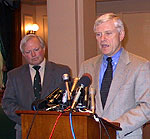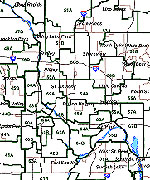Plan foreshadows legislative donnybrook
By Laura McCallum
Minnesota Public Radio
March 20, 2002
The legislative redistricting map released by the court pits 52 incumbents (See list) - more than a fourth of the Legislature - against one another in the 2002 election. The plan also reflects the growing political clout of the suburbs. Under the plan, rural Minnesota and the inner cities lose some legislative seats, while suburban areas gain seats.
| |
|
|
|
||
Under the plan, 18 senators and 34 House members are in districts where they will be paired up with another incumbent on the November ballot if they choose to run.
One of them is Rep. Betty Folliard, DFL-Hopkins, who's now in the same district as Rep. Jim Rhodes, R-St. Louis Park. Folliard says she still plans to run again.
"I'm not a shrinking violet. I'm not one to run away from a challenge, as some people know over here, and so as I look at it, this is just part of the deal. You know, we knew it was going to be tough," Folliard said.
Rhodes agrees that facing another incumbent won't change his plans to seek re-election.
"I don't think it's going to be an issue at all. I think it's just giving the voters a choice about what kind of representation they want," said Rhodes.
The Rhodes-Folliard match-up is one of 11 incumbent pairings that pit legislators from different parties. Fifteen pairings match legislators in the same party.
Assistant Senate Majority Leader John Hottinger of Mankato is now in the same district as his DFL colleague, Chuck Fowler of Fairmont. Hottinger says he may move two miles away so that he would live in a new open seat, because he says he won't run against Fowler.
"We're friends and we're colleagues, and I go to his fundraisers and say nice things about him in his district, because he deserves them. I enjoy being in the Minnesota Senate, but there are other things to do in life, even if I didn't decide to join my constituents in the new Senate District 23," Hottinger said.
| |
|
|
|
||
Hottinger and several other legislators now pitted against colleagues say they'll decide in the next few days whether to run again. Legislative leaders say if they could have agreed on a redistricting plan, it would have included fewer incumbent pairings than in the court-drawn plan.
The chair of the Senate Redistricting Committee, Sen. Larry Pogemiller, DFL-Minneapolis, says he tried to work out an agreement with the House over the weekend, so that the courts wouldn't have to decide the matter.
"The Republicans tried to offer us a map that would have made sure the House Democrats never had a chance to be in the majority. That's what they offered us, and we said 'no.' To protect Senate Democrats, we did not sell out the House Democrats," Pogemiller said.
House Republican leaders say they were willing to negotiate a plan, but the Senate wouldn't budge. Legislative leaders in both parties agree that the plan seems to be fair.
Republican House Majority Leader Tim Pawlenty of Eagan says the plan appears to help House Republicans, because their strength is in the suburbs.
"We believe this is a fair plan, and that's great news for Republicans, since we've been frozen out of redistricting for the last two decades," Pawlenty said.
Ten years ago, a DFL redistricting plan became law after Republican Gov. Arne Carlson failed to veto it on time. This time, rural Minnesota and Minneapolis-St. Paul lose a couple of Senate seats, and the suburbs gain seats.
Sen. Hottinger says the Senate will look much less rural next year. He points to three incumbent match-ups in southern Minnesota. "The south, just like the north, with the changes taking place up there, are not going to have as many voices, and as it relates to the north, not as many experienced voices," he said.
Two longtime Senate leaders from northern Minnesota - Majority Leader Roger Moe and Finance Committee Chairman Doug Johnson - have already announced they won't seek re-election. So far, seven lawmakers have said they're planning to retire from the Legislature, but the list could grow if legislators don't like their new districts.
More from MPR

